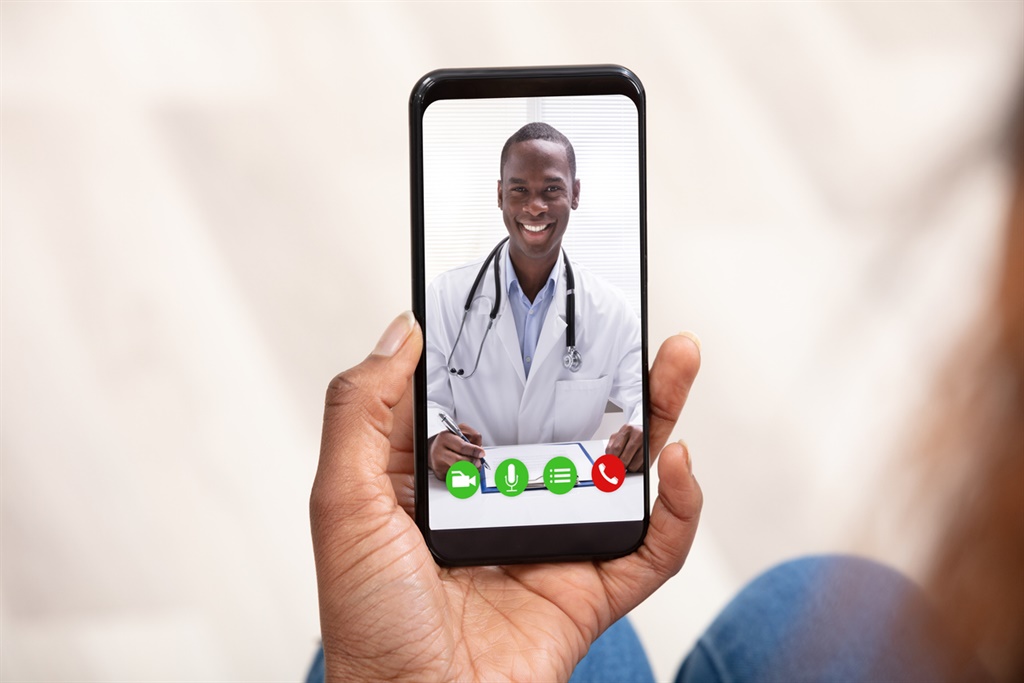


Covid-19 has led to a surge in demand for telehealth services Picture: iStock
- More private healthcare providers are now consulting with patients over video or phone call.
- The Health Practitioners Council of South Africa required doctors to meet face-to-face, but the Covid-19 pandemic has changed that.
- Virtual healthcare could introduce a more affordable and convenient way for South Africans to access care.
Virtual meetings and gatherings have become the order of the day as people adjust to ‘socially distant’ lives during Covid-19 – and the healthcare industry is no exception, as the use of telehealth grows in providing people with more affordable access to care.
This comes as patients continue to stay away from doctors’ rooms, with many delaying non-urgent procedures until it is safer to leave their homes.
Doctors and specialists, in particular, have been significantly impacted by the pandemic, with consultations declining between 60% and 90%, raising concerns about their livelihoods.
However, the pandemic has resulted in the growth of the telemedicine industry, also known as telehealth, which provides doctors with a virtual alternative to physical consultations and comes at a lower cost for patients.
- READ| WATCH | Uber offers Covid-19 contact tracing service
The use of telehealth in South Africa has been limited to date, since the Health Professions Council of South Africa (HPCSA) required doctors to have face-to-face consultations with their patients and telemedicine was meant to be an add-on, not a replacement for consultations.
The statutory body has since eased its guidelines following the lockdown, to allow for virtual consultations between doctors and patients, without having to meet in person.
It has also changed that term “telemedicine” to “telehealth” to include other practitioners like psychiatrists.
For Medical scheme Momentum Health, the easing of regulations has resulted in the growth of its telehealth business, which could previously only provide advice, not consultations.
Its Hello Doctor platform has seen an increase in patient interactions with doctors, from about 4 000 in May to 15 000 in June, according to its 2020 financial update.
“Legally, a year ago it was very difficult for us to grow Hello Doctor, because the regulator and the doctors’ councils were not very keen on telemedicine or any digital health services at all. In fact up until the start of lockdown, the legislation didn’t actually allow for it,” said Momentum Health’s executive head for marketing and distribution Damian McHugh.
- READ| ‘Workers had to resort to using refuse bags to protect themselves’ – Nehawu report
Momentum’s platform is available via an App or through USSD for people who don’t have smartphones or data.
McHugh said although some doctors have raised concerns that they will not be making as much money as they do through normal consultations, meeting their clients virtually is much better since it comes with less overhead costs.
He added that he hopes the regulations could become the new normal for South Africa after Covid-19.
McHugh said Momentum charges between R250 and R270 for its service, while-in person consultations can vary from R280, excluding medication, to R380 including medication. Some other practitioners charge more.
Telemedicine has also been beneficial for people with chronic conditions who can’t risk visiting their doctor during the pandemic.
Guidepost, a telehealth platform, connects its more than 15 000 users to practitioners through voice calls, video calls and WhatsApp.
Richard Johnson, COO of Guidepost said: “We have had our busiest months ever during the lockdown. The Covid-19 pandemic and lockdown conditions have made digital healthcare services, such as telemedicine, the only option for many people, driving rapid adoption and use of our services,” said Johnson.
He added that the convenience and lower cost of digital healthcare will change the way people access healthcare beyond Covid-19 and is likely to drive them to consult with their doctors more regularly.
- READ| Nehawu plans August protests after visits reveal dangerous public health working conditions
Dr Rajesh Patel, head of benefit and risk at the Board of Healthcare Funders, a medical scheme representative, lauded the HPCSA’s move to relax its regulations, saying it should be extended beyond the pandemic.
“It remains critical for the HPCSA to look at a long-term view of the application of these telemedicine guidelines to support efforts aimed at health systems reform, and to minimise unnecessary face to face consultations. This will reduce the burden on healthcare facilities and in turn help overcome barriers to access to health services,” said Dr Patel.
When asked if telehealth will be the new normal for South Africans, head of communications at the HPCSA, Priscilla Sekhonyana, said the council is considering the next step in telehealth policy, after the pandemic.

